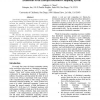Free Online Productivity Tools
i2Speak
i2Symbol
i2OCR
iTex2Img
iWeb2Print
iWeb2Shot
i2Type
iPdf2Split
iPdf2Merge
i2Bopomofo
i2Arabic
i2Style
i2Image
i2PDF
iLatex2Rtf
Sci2ools
114
click to vote
IPPS
2002
IEEE
2002
IEEE
Architecture of the Entropia Distributed Computing System
Distributed Computing, the exploitation of idle cycles on pervasive desktop PC systems offers the opportunity to increase the available computing power by orders of magnitude (10x - 1000x). However, for desktop PC distributed computing to be widely accepted within the enterprise, the systems much achieve high levels of robustness, security, scalability, unobtrusiveness, and manageability. We describe the Entropia Distributed Computing System, as a case study, detailing its internal architecture and philosophy in attacking these key problems. In particular, key aspects of the Entropia system include the use of: 1) scalable web/database technology for system management, 2) network tunneling and application namespaces for logical connectivity, 3) binary sandboxing technology for security and unobtrusiveness, and 4) open integration model to allow applications from many sources to be incorporated. These technologies are combined to produce a robust, flexible, high performance system which...
Available Computing Power | Desktop Pc | Distributed And Parallel Computing | Distributed Computing | IPPS 2002 |
Related Content
| Added | 15 Jul 2010 |
| Updated | 15 Jul 2010 |
| Type | Conference |
| Year | 2002 |
| Where | IPPS |
| Authors | Andrew A. Chien |
Comments (0)

